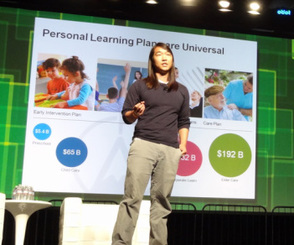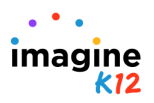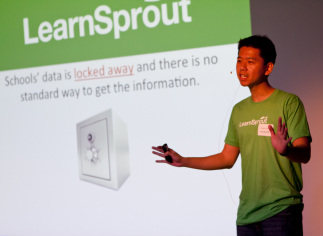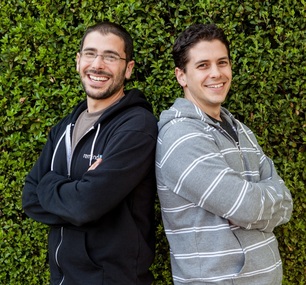by Sidhanth Venkatasubramaniam
 Daniel Yoo presents Goalbook at TechCrunch Disrupt
Daniel Yoo presents Goalbook at TechCrunch Disrupt Although the potential for Facebook-scale growth and success provides the motivation for many to subject themselves to the roller coaster ride that is running a startup, some are driven by frustration born out of first-hand experience with the limitations of tools in a given domain. Such a backdrop witnessed the genesis of Goalbook, the brainchild of software engineer and special education teacher Daniel Yoo, a set of tools targeted at making personalized student lesson planning a more enriching and collaborative experience for those involved.
Goalbook’s utility lies in the manner in which it tackles the several logistical difficulties that teachers face when trying to interface with one another to create individualized lesson plans for students. “Essentially, there are several teachers and administrative staff involved in the education of any given student, and it may not be practical for them to be able to meet with each other.”
Goalbook thus allows teachers to keep track of learning goals and teaching strategies tailored to individual students, resulting in a more individualized educational experience for students, which can have tremendous benefits for those with disabilities.
Daniel’s first experience with software development came as an undergraduate student at UC Berkeley in the department of Electrical Engineering and Computer Science. Following graduation in 2001, he moved to Oracle to work on the eBusiness suite as an entry-level programmer. Although the job afforded him the experience of working in a large-scale corporate environment, Daniel was not quite satisfied; having nurtured goals of contributing to society as a teacher since his youth, he sought a job that would “help him learn to be a better teacher and engage with children in an effective manner.” Daniel thus made his way to Cal State East Bay at Hayward, where he earned his teaching credential.
Goalbook’s utility lies in the manner in which it tackles the several logistical difficulties that teachers face when trying to interface with one another to create individualized lesson plans for students. “Essentially, there are several teachers and administrative staff involved in the education of any given student, and it may not be practical for them to be able to meet with each other.”
Goalbook thus allows teachers to keep track of learning goals and teaching strategies tailored to individual students, resulting in a more individualized educational experience for students, which can have tremendous benefits for those with disabilities.
Daniel’s first experience with software development came as an undergraduate student at UC Berkeley in the department of Electrical Engineering and Computer Science. Following graduation in 2001, he moved to Oracle to work on the eBusiness suite as an entry-level programmer. Although the job afforded him the experience of working in a large-scale corporate environment, Daniel was not quite satisfied; having nurtured goals of contributing to society as a teacher since his youth, he sought a job that would “help him learn to be a better teacher and engage with children in an effective manner.” Daniel thus made his way to Cal State East Bay at Hayward, where he earned his teaching credential.
| Although his credential licensed him to teach both general education and special education, Daniel found himself gravitating towards the latter, citing the belief that it would “challenge him more as a teacher by forcing him to work with students that had a very diverse set of needs.” | "Daniel qualifies his first year in special education as the most challenging he has ever faced. “I honestly don’t think I would be able to get through that year again.” |
Although he has experienced no trivial amount of turmoil and stress in running Goalbook, Daniel qualifies his first year in special education as the most challenging he has ever faced. “I honestly don’t think I would be able to get through that year again at this age,” he muses.
Daniel’s first experience in adapting the programming skills honed and refined in his undergraduate years to the education domain came in his second year as a special education teacher in the Ravenswood City School District. When inefficiency in the student data collection process, which was done manually by hand at the time, brought legal trouble upon the district, Daniel found a solution in creating software that could automate the process. Daniel’s tool was so successful that the district moved to adopt it in all of their schools just a year later. “Although it wasn’t the specific motivation for starting Goalbook, this was the first time my eyes were opened to the interdisciplinary opportunities for integrating software in education; up until then, I viewed them as two entities that necessarily had to be kept apart,” he reflects. “It really made me more optimistic that I could use a background in technology to the benefit of my students.”
Daniel’s first experience in adapting the programming skills honed and refined in his undergraduate years to the education domain came in his second year as a special education teacher in the Ravenswood City School District. When inefficiency in the student data collection process, which was done manually by hand at the time, brought legal trouble upon the district, Daniel found a solution in creating software that could automate the process. Daniel’s tool was so successful that the district moved to adopt it in all of their schools just a year later. “Although it wasn’t the specific motivation for starting Goalbook, this was the first time my eyes were opened to the interdisciplinary opportunities for integrating software in education; up until then, I viewed them as two entities that necessarily had to be kept apart,” he reflects. “It really made me more optimistic that I could use a background in technology to the benefit of my students.”
| The success prompted Daniel to apply to the Kauffman Education Ventures incubator program, to which he was accepted. Although he didn’t have a concrete idea at the time as to what sort of a product he sought to develop, he knew that he wanted to “tackle a problem facing districts nationwide.” | “It made me optimistic that I could use a background in technology to the benefit of my students.” |
As with many successful startups, Goalbook’s initial design was based on a critical analysis of the tools afforded in the status quo to educators. For Daniel, this task was simple. “There aren’t very many tools that seek to make special education easier or more enriching,” he muses. “Goalbook’s goal at a fundamental level was to fill that void we saw in the EdTech domain.” Although many early-stage founders must invest a significant amount of effort into spending time with potential users to develop a more nuanced understanding of the problems they face, Daniel had to look no further than his own five years of experience. “As a teacher, I knew what was hard and what needed fixing.”
| From there, Daniel made his way directly into the first cohort of startups funded and supported by Imagine K12. To him, the role that Imagine K12 played in Goalbook’s early years is one that can never be trivialized. | “As a teacher, I knew what was hard and what needed fixing.” |
“Imagine K12 brought together people who had the technical skills and vision to build an impactful product in EdTech,” he reflects. “At the time of entry, these software engineers weren’t necessarily people with a lot of business experience, and Imagine K12 was instrumental in throwing us into an environment that built up experience in the management side of the company.” The role the incubator played in helping Goalbook network also merits attention. “You really build a phenomenal network of people in Silicon Valley during your time in Imagine K12; our first major adopter and investor both came out of meetings arranged during this time.”
Although the challenges faced by Goalbook have been myriad, Daniel highlights negotiating with school districts as one of the most trying obstacles. “There is a fundamental mismatch in the philosophical approaches of startups and school districts,” he asserts. “School districts are very bureaucratic and complicated in structure, whereas startups strive for simplicity in their products.” The decentralization of authority in school districts also presents challenges in its own right. “The person we negotiate with isn’t the person who is going to be using our product, nor is it the person who is going to pay us for the service.”
Despite these challenges, Daniel has focused on adapting to their reality and working around them. “We have two full-time employees on our sales team that are now very experienced in the process, and we have a third one coming on board.”
In reflecting on Goalbook’s journey to this point, Daniel asserts his belief in having achieved product/market fit. “We now have a product that we are confident in presenting to school districts; our main goal at this point is figuring out how to market it in a way that is profitable for the company.”
Overall, the experience has been one that Daniel looks back on with pride. “I often find myself second-guessing decisions and choices I make on a day-to-day basis, but I have never questioned my decision to commit to the development of Goalbook.”
Although the challenges faced by Goalbook have been myriad, Daniel highlights negotiating with school districts as one of the most trying obstacles. “There is a fundamental mismatch in the philosophical approaches of startups and school districts,” he asserts. “School districts are very bureaucratic and complicated in structure, whereas startups strive for simplicity in their products.” The decentralization of authority in school districts also presents challenges in its own right. “The person we negotiate with isn’t the person who is going to be using our product, nor is it the person who is going to pay us for the service.”
Despite these challenges, Daniel has focused on adapting to their reality and working around them. “We have two full-time employees on our sales team that are now very experienced in the process, and we have a third one coming on board.”
In reflecting on Goalbook’s journey to this point, Daniel asserts his belief in having achieved product/market fit. “We now have a product that we are confident in presenting to school districts; our main goal at this point is figuring out how to market it in a way that is profitable for the company.”
Overall, the experience has been one that Daniel looks back on with pride. “I often find myself second-guessing decisions and choices I make on a day-to-day basis, but I have never questioned my decision to commit to the development of Goalbook.”
Sidhanth Venkatasubramaniam is a rising senior at Palo Alto High School who is working on a series of interviews and articles for the Imagine K12 blog. Sidhanth is currently involved in research projects involving algorithms and computational biology. In addition, he enjoys tracking startups and their impact, as well as freelance programming. In his spare time, he often enjoys playing Ultimate Frisbee and learning new (human) languages.



 RSS Feed
RSS Feed